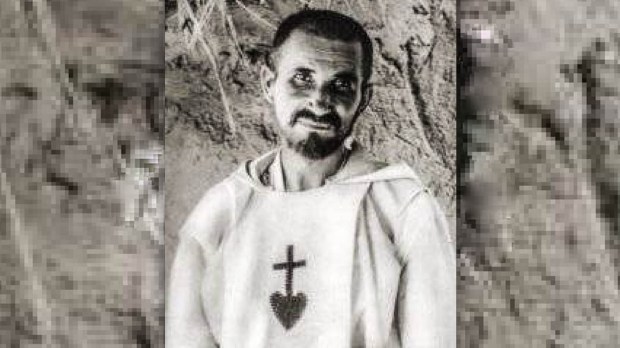Viscount Charles de Foucauld (1858-1916) was born the heir to a great fortune, but when he was only 5 years old he was orphaned. Left in the care of a loving grandfather, Charles became insufferably spoiled. His laziness and inclination to throw tantrums weren’t much diminished by age, and his anger at God soon made him an avowed agnostic.
Having turned his back on God, Charles later described himself at 15 as “all egotism, vanity, impiety, with every desire for evil.” With a fortune awaiting him and no moral compass to speak of, he became consumed by desire for sensual pleasure.
Charles lived a raucous life, though while his grandfather lived he showed some restraint. But In 1878 his grandfather died, and Charles inherited a vast fortune. From then on, there was nothing to stem his lascivious behavior; indeed, he seemed to delight in scandalizing the people around him. He was even known to tell his mistresses, “I rent by the day, not the month.”
Though his financial and social standing protected him from any real consequences for his debauchery, even the French Army had its limits. When Charles was sent to Algeria and insisted on bringing his mistress, he was given an ultimatum: send her back or lose your commission. Charles refused to leave his lover, though it seems this was more out of willfulness than out of love, as he tossed her aside soon after.
After that taste of Algeria, Africa was in the young nobleman’s blood. Charles later got permission to rejoin the army, then spent a year exploring Morocco, disguised as a wandering Jew so that he could visit villages no European had ever entered.
All this time, though Charles had everything the world could offer, he was hungry. He sought to fill his empty soul with fine food, women, even knowledge and academic accolades, but nothing was enough. Meanwhile, the Muslims he met in Africa lived with deep devotion; Charles was impressed by their dedication and began to seek.
After returning to France, Charles stopped in to the Church of St. Augustine for a moment to ask the priest a question. Finding Father in the confessional, he was quickly persuaded to make his confession. There, in that moment, the Holy Spirit brought about a miracle of conversion (doubtless through the intercession of St. Augustine himself). “The moment I realized that God existed,” de Foucauld later wrote, “I knew I could not do otherwise than to live for him alone.”
Though his soul had finally come home, his life would continue to be one of wandering. He spent seven years as a Trappist, then several more as a gardener to the Poor Clares, With every step, the Lord was refining in him a desire to be simple and poor, to come to others with no agenda other than love.
In 1901, at 42, Charles was ordained a priest and returned to the Sahara. There in Algeria, miles and miles from the nearest Christian, Fr. Charles sought to love the Algerian people so well that they would come to know Jesus, saying, “’I would like to be sufficiently good that people would say, ‘If such is the servant, what must the Master be like?’” Nobody converted. He hoped to found a religious order with an apostolate of friendship. Nobody joined him.
But since Fr. Charles was in the desert, Jesus was there, too, present above all in the Eucharist Fr. Charles spent so many hours adoring. That was what he was doing when the raiders rode up. They seized him and demanded that he recite the Shahada. When he refused to apostatize, he was tossed aside. Later, a young guard was startled and accidentally discharged his weapon; the shot hit Fr. Charles and left him dead.
Three weeks later, a detachment of French soldiers came to see to the priest’s proper burial. There in the sand, they saw a glint of gold: the monstrance, with the Body of Christ within. The commander mounted his horse and held the monstrance before him, riding at the head of the company in a 25-mile Eucharistic procession through the Islamic desert.
There, in death, Fr. Charles began to achieve the success that was never his in life. In the 20 years after he died, three different religious orders were founded on his spirituality, with several more since. Today, thousands of people have been converted and thousands more strengthened in their faith through the witness and intercession of a wandering hermit with a checkered past.
Blessed Charles de Foucauld was given meaning and peace after a life of emptiness, all because he came to know Jesus. On December 1, his feast day, let’s ask his intercession for all who seek fulfillment without Christ, that they would come to know him in a way that fills their hearts with deep, abiding joy. Blessed Charles de Foucauld, pray for us!

